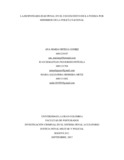La responsabilidad penal en el uso excesivo de la fuerza por miembros de la policía nacional
Fecha
2017Autor
Ortega Gómez, Ana María
Figueredo Peñuela, Juan Sebastián
Herrera Ortiz, María Alejandra
Título obtenido
Abogado(a)
Director de tesis
González Buitrago, John FredyPublicador
Universidad La Gran Colombia
Facultad
Facultad de Derecho
Programa
Derecho
Citación
Compartir
Resumen
Constitucionalmente, la Policía Nacional, es una institución creada con el fin de ser el garante de mantener las condiciones necesarias para el ejercicio de los derechos de todas las personas en el territorio nacional, con el objetivo de proteger y mantener el orden social y la convivencia entre ciudadanos. La Policía Nacional debe realizar las actividades que sean pertinentes para hacer efectivo este fin, de igual manera, debe emplear los medios que sean necesarios para salvaguardar los bienes jurídicos protegidos cuando estos están en peligro. El modus operandi de la Policía debe regirse bajo un marco democrático, el respeto al estado social de derecho, y por su puesto como institución deberá velar por la protección y el respeto por los Derechos Humanos, en adelante DDHH. La actividad policial implica por su puesto un margen de error mínimo, por lo que en algunos casos pueden verse vulnerados ciertos bienes jurídicos tutelados por parte de funcionarios en servicio de la Policía Nacional; cuando esto sucede deberá iniciarse un proceso para determinar la situación jurídica de quien transgrede estos derechos; sin embargo, será pertinente que se realice un examen exhaustivo de la conducta del funcionario que comete la infracción, ya que en algunos casos como el que se examinará en esta investigación, el individuo en servicio podrá ser eximido de responsabilidad penal, cuando actúa bajo los preceptos legales y bajo el limite permito, de acuerdo al principio de limitación y control. Esto indica que no será responsable penalmente, cuando ejecuta la acción para salvaguardar un derecho propio o de terceros, es decir, cuando desarrolla una actividad bajo la legítima defensa o su deber de actuar con base en su función policiva por mandato constitucional. Así mismo, para proteger derechos colectivos, mitigar la amenaza y prevenir un daño más grave del que se está produciendo por quien comete un delito.
Abstract
Constitutionally, the National Police is an institution created with the purpose of being the guarantor of maintaining the necessary conditions for the exercise of the rights of all the people in the national territory, with the objective of protecting and maintaining social order and coexistence between citizens. The National Police must carry out the activities that are pertinent to fulfill this purpose, likewise, it must use the means that are necessary to safeguard the protected legal goods when these are in danger. The modus operandi of the Police must be governed by a democratic framework, respect for the social status of law, and of course as an institution must ensure the protection and respect for Human Rights, hereinafter Human Rights. The police activity implies a minimum margin of error, so that in some cases certain legal rights protected by officials in the service of the National Police may be violated; when this happens, a process must be initiated to determine the legal status of those who violate these rights; however, it will be appropriate to conduct a thorough examination of the conduct of the offending official, since in some cases such as the one to be examined in this investigation, the individual in service may be exempted from criminal liability when acting under legal precepts and under the limit I allow, according to the principle of limitation and control. This indicates that he will not be criminally responsible, when he acts to safeguard his own right or third party, that is to say, when he carries out an activity under self-defense or his duty to act based on his policing function by constitutional mandate. Likewise, to protect collective rights, to mitigate the threat and to prevent more serious harm than is being produced by a person who commits a crime.
Colecciones
- Derecho [695]

